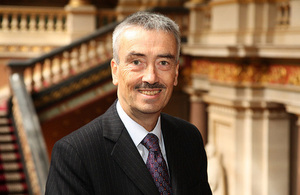
The new British Ambassador to Libya, Peter Millett, has just taken up his post. Like his predecessor and so many other ambassadors he is currently based in Tunis although he spent the last few days at the UN-brokered Dialogue negotiations in Skhirat, in Morocco. He writes that Libya needs to embrace them if there is to be peace in the country
Tunis, 30 January 2015:
I spent most of the first week in my new job as British Ambassador to Libya in Skhirat, Morocco. It was a good chance to meet and get to know the members of the Libyan Political Dialogue.
Before arriving in Tunis I concentrated on trying to get an understanding of Libya. If you want to get under the skin of a country, you have to develop an understanding of the history, culture, politics, economics and society of the place. You can read the background, but you really need to speak to the people. That task is obviously much harder if you can’t actually go to that country.
Reading the history showed me how much the Libyan people have suffered in recent years. Long years of dictatorship filled people with fear. Lack of a proper government meant that public services collapsed. And the country’s wealth, which should have been shared between all parts of Libya to improve the lives of ordinary Libyans, was frittered away.
Libya’s history is littered with horrific images of human rights abuses. In the 1970s students who dared to call for change were publically executed. More recently, protesters in 2011 were shot in cold blood. Qaddafi’s threat to cleanse Libya inch by inch, house by house, alley by alley was the last straw.
Now, four years after the revolution, the people still haven’t got what they rose up for. So what is it they are seeking? Listening to some of the Libyans at Skhirat, it is clear that Libyans want the same as anyone else, whether in Britain or elsewhere in the Arab world.
They want a normal life: to live without fear; to have a place to live safely; to have a job and earn a living; to have the dignity of putting bread on their family’s table; to educate their children; to have an efficient health system if they get sick; and to have a voice in the way they are governed.
These aspirations are fair and reasonable. But what I heard from the representatives in Skhirat was that the Libyan people are suffering. They are fed up with the fighting and the uncertainty. They fear the terrorists and criminals like Daesh. And they know that their country has the resources to make their lives better.
The solutions to the crisis in Libya are up to the Libyans themselves. Why should the outside world bother? The answer is simple. The United Kingdom has a historical relationship with Libya. The NATO operation to protect civilians in 2011 led to the overthrow of Qaddafi. We now want to see stability restored to the country, its unity preserved and its people’s human and civil rights respected. What is good for Libya is good for us.
The terrorist incident in Tunisia last week which killed 39 people, mainly British tourists, highlighted the need to tackle terrorism in the region. We also have to put an end to the criminal trafficking of people across the Mediterranean.
The best way to deal with all these issues is to support the negotiations between Libyans to establish a Government of National Accord. This agreement is designed to put an end to the chaos and divisiveness in the country. It should also bring peace for Libyans.
To achieve that, we need the participants in the dialogue to take responsibility, demonstrate leadership and show courage to make the necessary compromises. Their goal should be simple: to bring benefits to the Libyan people.



